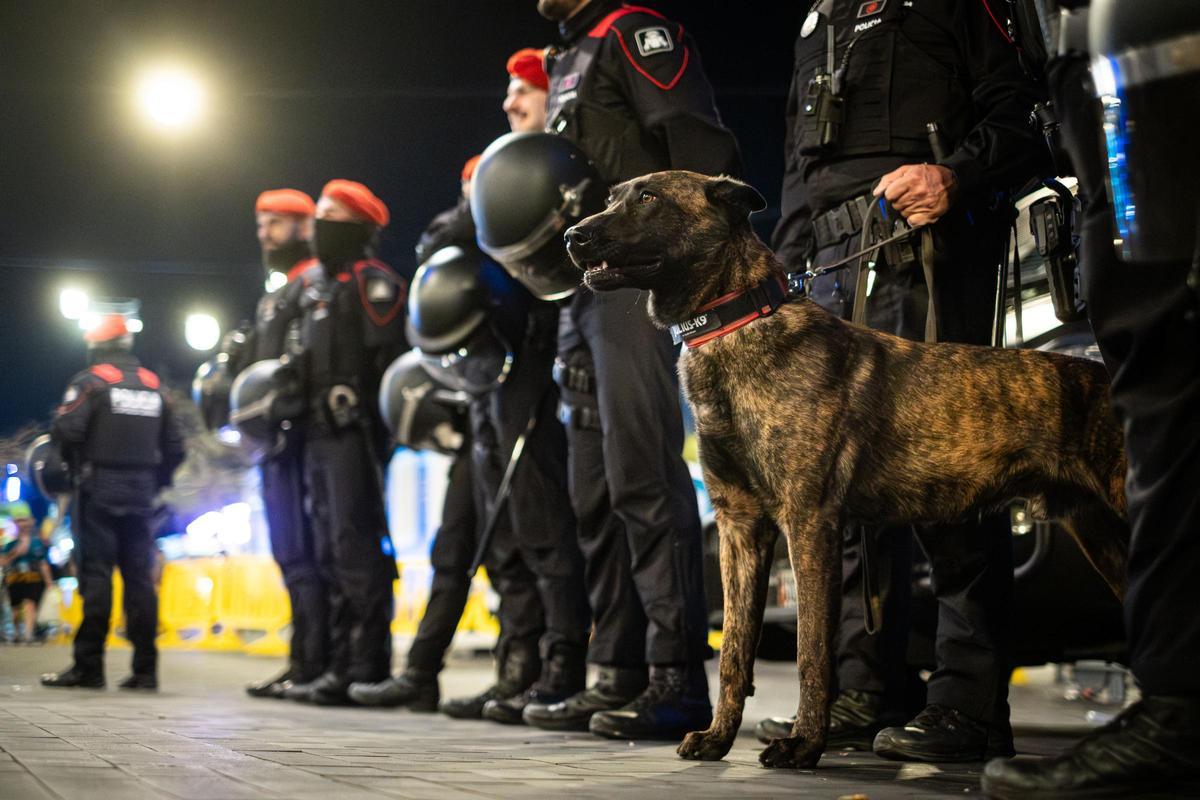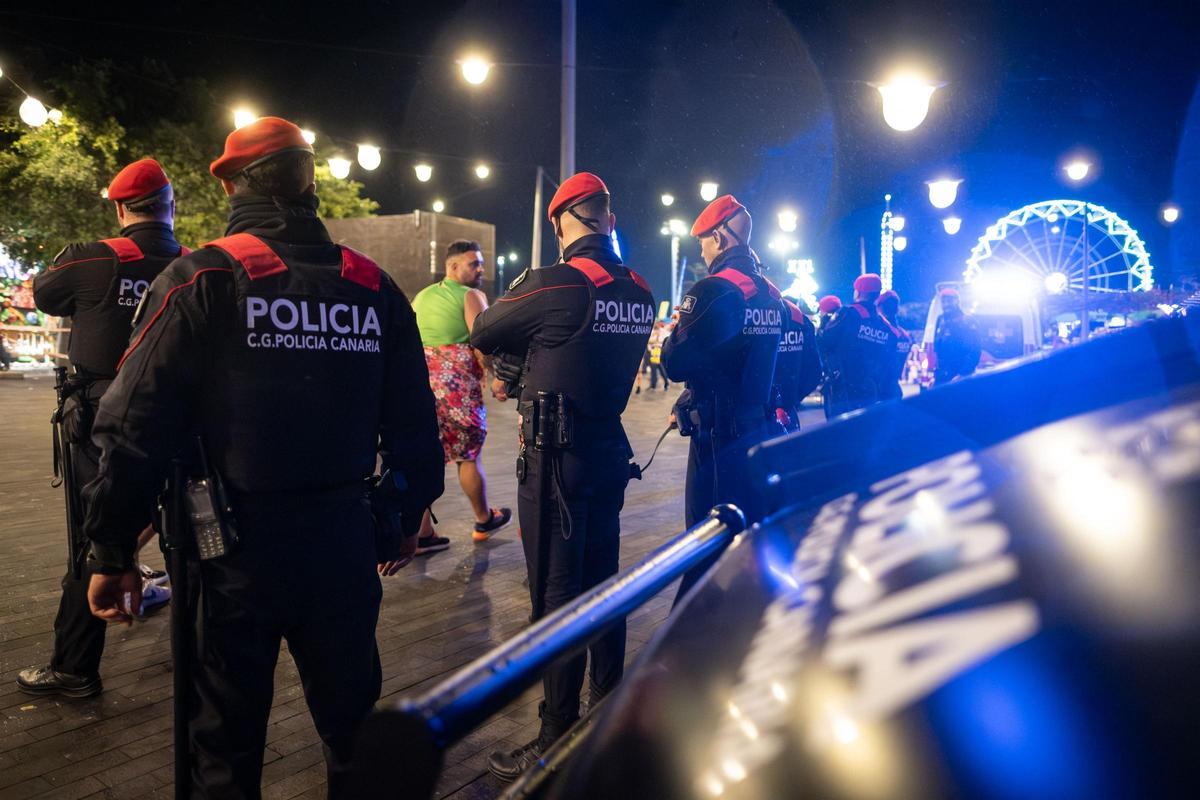There are areas in Tenerife and on other islands where the population, along with the surge noted in specific nightlife districts and gatherings during certain occasions, significantly exceeds the capacity that the Local Police of that municipality can manage.
In this context, it is vitally important to have support such as The Prevention, Reaction, and Intervention Unit (UPRI) of the Autonomous Police to assist the local security forces as well as the Civil Guard and National Police when necessary.
Established in early 2024, this team, comprising the Operational Response Group (Grope) and the Canine Unit, also benefits greatly from the Air Operations Unit, which utilises drones to identify where issues of public disorder or other incidents may arise within a crowd.
Currently, the General Corps of the Canarian Police (CGPC) possesses two drones and a total of six pilots.

Agents of the Autonomous Police of the Canary Islands during the Santa Cruz Carnival / Andrés Gutiérrez
Carnival Nights
The UPRI was active during the Santa Cruz de Tenerife Carnival on two of its most significant nights, Carnival Monday and Piñata Saturday.
On both occasions, their operational area was in close proximity to the Cabildo. Thanks to the efficiency of the canine unit, they managed to Apprehend five individuals for possession of narcotic substances and reported two others carrying illegal weapons in the early hours of Sunday.
Throughout other days of the Chicharrero Carnival, they participated in various events and at the fair. Two female officers were included in the intervention team.
Support for Other Agencies
Comprising around 40 officers and overseeing the province of Santa Cruz de Tenerife as well as several areas in Las Palmas, the team of the General Corps of the Canarian Police (CGPC) was formed to support local police and State Security Forces during major festive, sporting, cultural, or social gatherings. It was also established for the purpose of enhancing citizen security.
This unit is typically activated upon the request of municipalities that seek additional police resources for specific celebrations or locations that may result in public safety or security issues.
Since March of the previous year, they have been deployed to the towns of Llanos de Aridane, Tazacorte, and El Paso. The local authorities requested surveillance over certain streets concerning drug trafficking and use, disturbances of the peace, or the presence of problematic bars.

Agents of the Autonomous Police of the Canary Islands during the Santa Cruz Carnival / Andrés Gutiérrez
Increased Presence
Their presence has been augmented. According to sources within the regional police, over the last three months, the UPRI has been active four days a week in the Aridane Valley. This ongoing effort has resulted in approximately 200 minutes of complaints regarding fights, drug usage in public spaces or possession of forbidden weapons.
Since its inception, the unit has executed around 140 arrests for various offences across the Canary Islands, in addition to 340 investigations. Many of these charges relate to violations of road safety laws identified during traffic controls, particularly If individuals lack a driving license, have not passed the vehicle inspection or do not possess insurance.
A frequent area of their operations is the southern part of Fuerteventura, addressing similar issues as those in La Palma. For instance, in Gran Tarajal, a minor was detained who attempted to push an officer from the unit when identified. Upon searching him, it was revealed that he was in possession of 10 grams of cocaine and 21 grams of hashish.
Furthermore, in Tías (Lanzarote), the unit issued 13 minutes for drug possession. Officers even had to leap into the sea to rescue an individual who had entered the water, reportedly intending to take his own life and was resistant to exiting.
Controls
Officials from the CGPC assert that “the presence significantly aids in Dissounting Criminal Activity.” Regularly, one or more checks on individuals and vehicles are conducted on public roads each day.
The security personnel clarify that presently, in cases of drug trafficking arrests or complaints involving public narcotic consumption, the most commonly encountered substances include traditional options such as hashish, marijuana, and cocaine.
In this endeavour, the canine unit plays a crucial role. In Tenerife, there are four handlers and eight dogs, while Gran Canaria has three handlers and four dogs.
Requirements for Participation
To be a part of the UPRI, one must exhibit a strong work ethic and availability. Officials assess applicants based on their training, experience, and skill sets.
Among various requirements, individuals need to know how to efficiently work as a team and trust their colleagues, similar to any intervention unit. Moreover, they must acquire skills in deterrence and persuasive techniques.
Additionally, the UPRI offers support for Actions carried out by the Autonomous Community, such as in searches for industrial activities or complicated projects. They also assist in the eviction of social housing owned by the Canarian government that has been unlawfully occupied.
















